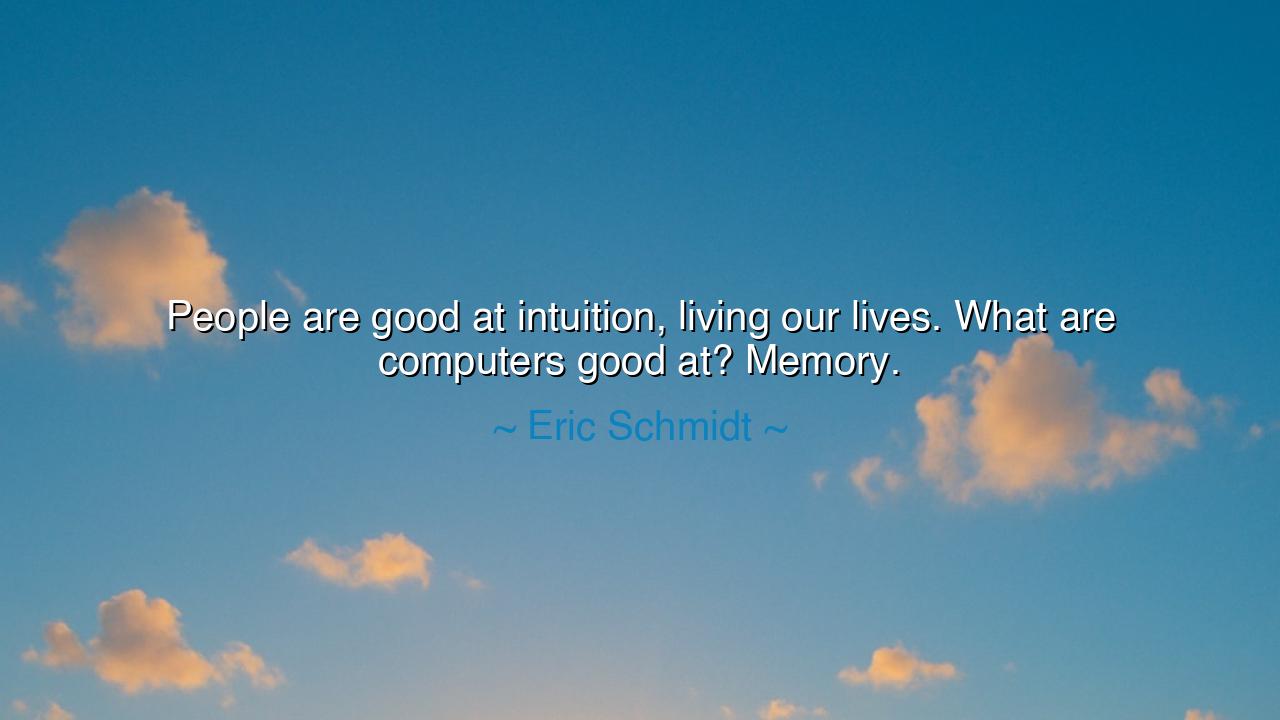
People are good at intuition, living our lives. What are






In the timeless expanse of human history, there have always been moments when the wisdom of the ages collides with the march of progress. The words of Eric Schmidt, "People are good at intuition, living our lives. What are computers good at? Memory," encapsulate this profound tension. Schmidt draws a stark contrast between the intuitive nature of the human mind and the mechanical precision of machines—two forces that, though intertwined, serve vastly different purposes in our journey through life. These words, spoken in the language of modern technology, carry with them the ancient wisdom of the Greeks, who understood that the mind’s capacity for reason and feeling could never be replicated by mere tools.
The ancient Greeks placed immense value on the human mind, viewing it as a divine gift. Plato, in his Republic, spoke of the soul’s journey through the world, driven by reason, emotion, and instinct. For Plato, intuition—that deep, unspoken understanding that guides us through our daily lives—was a key part of what made humans distinct from other beings. Intuition, driven by the wisdom of experience and the heart's compass, allows us to navigate the world not with a list of instructions, but with an understanding that transcends logical thought. In this light, Schmidt's words are a reminder of the human spirit—the ability to adapt, to feel, and to choose based on more than just what is seen or remembered.
In contrast, the Romans, in their mastery of engineering, did not place the same emphasis on the inner workings of the mind but saw technology as a means of externalizing human power. Their aqueducts and roads were marvels of engineering, built on the strength of memory—the ability to replicate designs and ideas over time. Yet, they knew, as Cicero and other great thinkers did, that no machine could replicate the depth of human experience. The Romans understood that while machines were tools to serve humanity, the human mind was still the guiding force behind progress. Just as Cicero's speeches moved nations, so too did humans' ability to think, to reason, and to intuit shape the course of history.
The role of memory, as Schmidt points out, is where computers excel. From their humble origins, where they served as simple calculators, computers have evolved into vast repositories of information. Their capacity to store and retrieve vast amounts of data is unparalleled by any human mind. The ancient Egyptians, in their construction of the pyramids, used rudimentary tools and measurements to create structures that stand the test of time. Yet, their ingenuity came not from mere mechanical repetition, but from their ability to understand the principles of the universe. Today, computers mimic that memory, able to recall details with accuracy and speed that would overwhelm any human. They are, as Schmidt suggests, tools of memory, storing every piece of data with infinite precision.
However, while machines excel in memory, humans excel in imagination and intuition. Leonardo da Vinci, the polymath of the Renaissance, understood that the mind could be both a tool and a canvas. His work, spanning art, engineering, and anatomy, demonstrates the profound leap that human intuition can achieve. Da Vinci's mind could envision things beyond the present reality, from machines to the flow of the human body, and this was made possible by his ability to perceive patterns that others could not. In his ability to dream and create, he represents the best of human intuition, the ability to shape and transform the world through insight, not just recollection.
Schmidt's reflection on memory and intuition serves as both a celebration of human potential and a cautionary tale. While computers are tools that can store and recall infinite amounts of information, they are devoid of the imagination and emotion that fuel human growth. The lesson we take from this is that while technology can assist us in organizing, remembering, and calculating, it cannot replace the human touch—the intuitive insights and creative leaps that push society forward. The challenge we face, as humans, is to harness the power of memory and intelligence in ways that elevate our intuition and vision.
The path forward, as Schmidt suggests, is not to abandon intuition in favor of the cold, mechanical workings of machines, but to balance both. We must use the tools of memory that technology offers to complement the power of human insight. The ancients understood this balance—the Greeks, the Romans, and Leonardo da Vinci all sought to intertwine technology with the human experience. We, too, must learn to live in a world where the machine aids our understanding, but never replaces the essence of our intuition, our creativity, and our humanity. Let us embrace technology, but always remember that it is our intuition—the spark of human genius—that will continue to shape the world.






AAdministratorAdministrator
Welcome, honored guests. Please leave a comment, we will respond soon